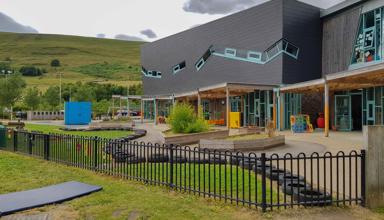Article by Michael Dauncey, National Assembly for Wales Research Service
This is the second in a series of articles this week looking at the Donaldson Review.
Today we focus on its proposals for how the curriculum should be organised and what it should include.
Professor Graham Donaldson advocates a combination of the established approach of a subject-based curriculum with a more dynamic approach based on skills and competences.
The Review found significant support amongst teachers and schools for a shift towards organising learning around skills and/or themes. Children and young people told the Review they wanted more opportunities to learn general social competences, including ‘life skills’. They also said the current curriculum was out of date with the latest digital technology, a concern shared by representatives of business the Review heard from.
Purposes of the curriculum
One of the strongest messages from Professor Donaldson is there should be a ‘straightforward, enduring statement of curriculum purposes for Wales’. Without such ‘clear and agreed purposes’, the implied argument is if we don’t know why we are doing this, how can we know what to do and how to do it?
The Donaldson Review recommends four purposes to the Curriculum for Wales and says that, if generally supported, they should ‘guide all future decisions about national and local educational priorities and underpin all teaching and learning in Wales’.
The four purposes are that all children and young people will be:
- Ambitious, capable learners who are ready to learn throughout their lives.
- Enterprising, creative contributors who are ready to play a full part in life and work.
- Ethical, informed citizens who are ready to be citizens of Wales and the world.
- Healthy, confident individuals who are ready to lead fulfilling lives as valued members of society.
Curriculum content: Areas of Learning and Experience
The report asserts this is an opportunity to design a curriculum structure that meets the four purposes, provides for an integrated cross-curricular focus, and combines both over-arching competences with traditional subject-based content.
Professor Donaldson recommends that the curriculum is organised around six ‘Areas of Learning and Experience’ rather than separate, narrow subjects as at present. This would build on the precedent of the Foundation Phase which uses Areas of Learning whilst widening the concept to also recognise the value of learning through experiences.
[caption id="attachment_2078" align="alignright" width="300"] Image from Pixabay. Licensed under the Creative Commons.[/caption]
Image from Pixabay. Licensed under the Creative Commons.[/caption]
The six Areas of Learning and Experience recommended by the Donaldson Review are:
- Expressive Arts
- Health and Well-being
- Humanities
- Languages, Literacy and Communication
- Mathematics and Numeracy
- Science and Technology
These Areas of Learning and Experience would apply from the age of 3-16 and provide for the continuum of learning which the Welsh Government asked the Review to conceptualise. It is also hoped this will overcome some of the problems associated with transition between key stages, which was another area the Welsh Government wanted Professor Donaldson to look at.
Professor Donaldson does not intend the Areas of Learning and Experience to be timetabling devices but that they should be used to organise each child and young person’s learning. Decisions and plans for how these should translate into day-to-day activities would take place ‘creatively’ at school level. This is arguably far easier envisioned than delivered and implementation of this will be both challenging and crucial.
Pages 43-51 of Successful Futures envisage how each of the six proposed Areas of Learning and Experience might be constructed. For each Area, there is a rationale, an outline of its scope and an illustration of relevance to the four curriculum purposes.
- In Expressive Arts, it is intended that pupils will develop their creative appreciation and talent, and their artistic and performance skills. They will have opportunities to explore thinking, and refine and communicate ideas through creatively using their imagination and senses. Consideration of this Area takes account of Professor Dai Smith’s report on Arts in Education.
- The Health and Well-being Area aims to help children and young people to build the knowledge, understanding and skills to develop positive and appropriate relationships, deal with difficult issues and decisions, and learn to live independently. This will focus on sport and physical activity, which was the subject of the Task and Finish Group led by Baroness Tanny Grey-Thompson, as well as mental and emotional well-being, and issues regarding sex and relationships.
- The Humanities Area will seek to give pupils an understanding of historical, geographical, political, economic and societal factors, providing opportunities to engage in informed discussions about ethics, beliefs, religion and spirituality. It will draw on existing subjects, history, geography, business and social studies, as well as religious education, which Professor Donaldson recommends should remain a statutory curriculum requirement from Reception year onwards.
- The Languages, Literacy and Communication Area aims to provide the fundamental building blocks for different forms of communication, literacy and learning about language. It will also give opportunities to learn different languages, as well as both Welsh and English. Digital competence will be a central part of this area, in line with it being afforded similar status in the curriculum as literacy and numeracy.
- Through the Mathematics and Numeracy Area, pupils will be expected to develop a good, lasting understanding of mathematical concepts and have the confidence to apply numerical skills in everyday life. It will include developing financial skills and applying them to real-life situations. The Area will centre on the discipline of mathematics, including the traditional components of arithmetic and statistics together with logic, providing a strong link with the skills necessary in science and technology.
- Science and Technology are described respectively as acquiring knowledge through observation and experimentation, and subsequently applying this scientific knowledge in practical ways. Computer science is proposed as a specific component within this Area, taking forward the recommendation from the ICT Steering Group’s report to the Welsh Government that it be introduced into the curriculum.
Tomorrow’s article will look at what the Donaldson Review says about organising progression through the curriculum and what it means for the established system of key stages based on ages.






